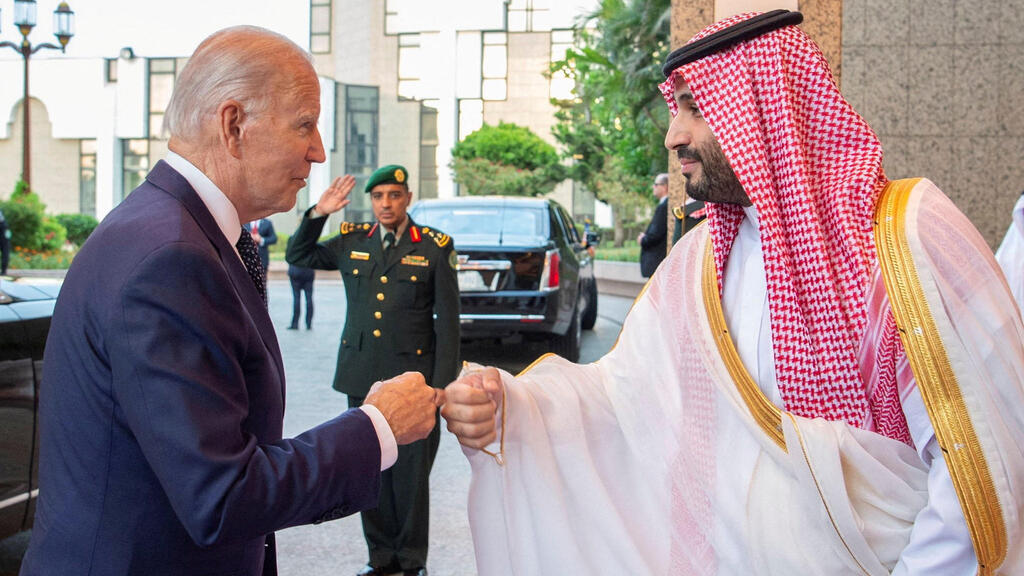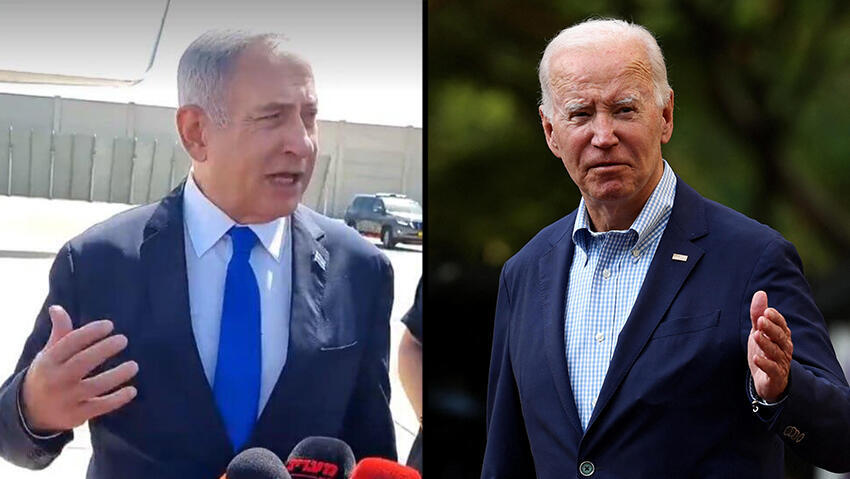Getting your Trinity Audio player ready...
Protesters show Netanyahu clips in New York
There will be smiles and handshakes for cameras when U.S. President Joe Biden and Prime Minister Benjamin Netanyahu meet later today on the sidelines of the UN General Assembly in New York. But once the photo opportunity is over, the smiles will disappear and the possible Saudi deal and intelligence matters will be on the table. But there is one subject Biden would never have thought he would have to discuss with an Israeli prime minister and that is the future of Israel's democracy.
Read more:
As on every overseas trip and interview with the American media, Netanyahu is trying to present a much-softened depiction of the judicial overhaul and his role in it. But Biden has seen and heard it all and knows Netanyahu better than any other world leader. The prime minister will have to convince the president that what he sees on television, what he saw on the 60 Minutes report, is not what it appears to be.
There is no doubt that what Biden sees as the most important Middle East matter is the Saudi deal. All the rest is nothing but background noise. The deal is also of vital importance to Netanyahu and may establish, or perhaps by some accounts, save his legacy. On the basis of both their needs, Biden and Netanyahu will have to find a way to silence the noise but the prime minister's job will be especially difficult if it rises from the street just below where the two leaders will be meeting.
We need each other, Biden will tell Netanyahu. The U.S. has neglected the Middle East and now a new chapter is beginning. We are back. We have a joint interest in the Saudi deal and we both face the Iran-Russia-China axis. This is a historic opportunity for change, he will say. But he will also add that interests are not the be-all and end-all.
Israel U.S. ties based on mutual values
The special relations between the U.S. and Israel, over decades, were also based on the joint ethos of democracy and that is at risk of fracturing.
Biden will tell the prime minister that he had already said that there is the most extreme government in memory, now in power in Israel and its policies on the Palestinian question but also on the legislative legislation, is damaging those special relations. I hear that your judicial laws are meant to strengthen Israel's hold on the West Bank, the president will say, and allow settlers to take control of more territory and establish more outposts – in direct contradiction to the 2003 commitment made by the government in Jerusalem.
So what would you prefer? The leader of Israel's most valuable strategic ally will ask Netanyahu if changing the makeup of the panel that selects judges, will harm relations with the U.S.? or a united Israeli-American-Arab front against Iran.
Netanyahu will claim that there is no assault on democracy. I've frozen most parts of the reform, he will tell Biden and claim that in the U.S. too, judges are selected by politicians so why should that not be allowed in Israel? Biden will likely chuckle and explain that when Israel has the tradition of a constitution that has lasted over 200 years, two houses of parliament and the same system of checks and balances that America has, then the prime minister would be able to peddle those claims.
Protesters project banner on UN ahead of Netanyahu visit to the General Assembly
I want you to understand, he will say, it is your right to decide to succumb to the pressure of the most extreme elements in your government, all the way from Justice Minister Yariv Levin, from the Likud to Finance Minister Bezalel Smotrich, from far-right the Religious Zionist Party, but don't be surprised when you lose the support of American Jews who now refuse to meet with you, and of a growing number of Democrats in Congress who are tired of your government's behavior and regard it more and more as a dark regime.
In the last month of the Obama administration, we refrained from vetoing UN resolution 2334, Biden will say, that pronounced West Bank settlement to be illegal. Make no mistake, he will say, this is the position of the United States and if you persist in your judicial changes, even only in the makeup of the panel to select judges, the matter would move to the International Court of Justice.
Biden will tell Netanyahu that he agreed to meet him despite pressure. Only yesterday you said you were not keen on the legislation, he will say. It is time for action and not only talk. You don't have to do this for my sake but for the sake of Israel.
So, what will Netanyahu do? Will he again release a statement that would be followed by denials, as he had done twice in recent months? Which interest would he favor? Not only Biden requires and answer. Most Israelis are waiting for one, as well.
On the face of it, there is no consensus among the leaders, on Iran. After the prisoner swap that included the release of six billion dollars for Raisi's regime, there are rumblings below the service, that are not entirely to Israel's benefit. It is hard to hide the fact that Israel gains nothing from the deal and some may see it as an additional step by the Biden administration towards an American-Iranian nuclear agreement, just as Tehran announced it was revoking the visas of three of the most senior and experienced inspectors of the International Atomic Energy Agency (IAEA).
But not all is black or white and some Israeli officials say this is the administration's way to stop the Iranian race to nuclear capability. It is a
This is a positive path, Biden will say it will improve ties that do not include the cooperation of oil companies on either side. American companies have been forbidden to invest in Iran or purchase its oil for the past four decades while Iranian oil continues to be sold to India and China but Tehran faces difficulties there as well. Boing received an order of 129 planes from two Iranian companies, and those deals will not be completed.
Is U.S. heading back to Iran nuclear deal?
The question is whether Americans will invest in rebuilding Iran's aging oil fields or fund their exploration of new foil and gas fields. That is not likely as long as the ayatollahs are in power. Netanyahu will say that Russia is interested in such investments, to push American buttons, and may even usurp some of the revenue they would yield. He will also attempt to coordinate possible steps against Iran's continued violations of the 2015 nuclear deal and will highlight the importance of deterrence as Iran nears nuclear capability. The leaders may also discuss the protests in Iran after the killing of Masha Amini, while protesters in Israel warn of the threat to women from Netanyahu's government.
The most complex and volatile matter in the Middle East is the Israeli-Palestinian conflict. Leaders have tried to delve into the dispute, offered far-reaching solutions and presented visions for a better future for both peoples, but to no avail.
The Saudi peace plan includes positive measures towards the Palestinians and concessions from Israel. Netanyahu is expected to say that there is no point in finalizing a deal with Palestinian President Mahmoud Abbas, who is old and sick and nearing the end of his reign and that whoever succeeds him will want to formulate his own deals. The prime minister will however suggest possible areas of cooperation, but Biden will tell him those are not enough and will demand more creativity in finding solutions to the problem of unemployed Palestinian youth who find their way to crime and terror.
Netanyahu need not explain to the president, who receives intelligence reports, why he may want to include National Unity leader Benny Gantz to his government and remove the more extreme elements currently partnering in his coalition. Finance Minister Bezalel Smotrich and National Security Minister Itamar Ben-Gvir are blocking any attempts at reaching an understanding with the U.S. on the matter of Palestinians.
Netanyahu must consider when MBS takes full control of his country. That could be imminent or in a year, as soon as King Salman dies. Until then, the Crown Prince is collecting opportunities, listening and learning. He will not jump the fence, certainly not in the direction of Israel. A senior advisor to MBS in Riyad says, is already in his pocket. What would the Palestinians gain? Time will tell but they are part of the equation and that cannot be ignored.
Saudi peace plan not dead
The 2002 Saudi peace initiative is still on the table and is considered the best offer, by Saudi officials speaking to Israelis. It specifically includes the establishment of a Palestinian state in the West Bank, with East Jerusalem as its capital. Biden may quote from it but Netanyahu will tell him he will not back down from a united Jerusalem.
The Saudi Crown Prince shares Netanyahu's views on the dangers posed by Iran. That is a good starting point for agreements. Even if Riyad sent a new ambassador to Tehran and reinstated diplomatic ties, the concerns remain.
Netanyahu will present Biden with a map showing Saudi concerns along with a map of secret Iranian deployment in Lebanon, Syria and Iraq and its attempts to gain access to the Gaza Strip, the West Bank and Jordan.
3 View gallery


U.S. President Joe Biden with Saudi Crown Prince Bin Salman on a visit to Saudi Arabia
(Photo: Reuters)
Netanyahu is keen to understand whether Biden intends on reaching a normalization with Saudi Arabia. Recent reports have indicated the administration has lowered its expectations of achieving such a deal, which could be an attempt to set the stage for its demise. Washington may also be unsure whether an agreement with the Saudis would be possible in an election year.
But for now, The U.S. has an interest in forming relations between Riyad and Tel Aviv. Netanyahu was even invited for a clandestine visit to Neom the Saudi's futuristic city planned to be built near the borders with Egypt and Jordan and not very far from Eilat. The prime minister leaked the invitation to the local press, a move that angered the crown prince.
For now, Biden's advisors call for talks to be held at a pace dictated by the Saudis. Netanyahu and Biden will agree that if the U.S. takes a step back, Russia and China will quickly move in to replace it. Bin Salman, Netanyahu will claim, is keeping all options open and time is on his side. He will say that there must not be permission granted for any nuclear reactor of any kind to be given to the Saudis.






